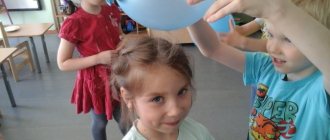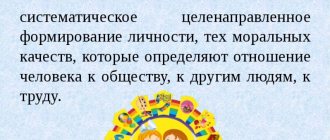Cognitive abilities of preschool children as a psychological and pedagogical problem
Characterizing the problems of psychological and pedagogical sciences of the 21st century, Academician D.I. Feldshtein says that not only the world in which a person lives has changed, but also the person himself [2]. Based on specific data obtained by scientists, the academician states that the degree of real changes in the historical situation has objectively determined the qualitative mental, psychophysiological, and personal changes of the modern child. “The modern child, while maintaining the essential foundations and effective mechanisms of consciousness and thinking, is strikingly different not only from the “Child” described by Comenius and Pestalozzi, Ushinsky and Pirogov, Zazzo and Piaget, Korczak and other great educators of the past, but is even qualitatively different from child of the 90s of the twentieth century. At the same time, the child has become no worse or better than his peer twenty years ago, he has simply become different” [1]. Characterizing the real changes in the modern child, D. I. Feldshtein speaks of profound changes in his perception, attention, memory, consciousness, thinking, the nature of his orientations and other characteristics. As a difference that comes to the fore, he names a sharp decline in the cognitive development of preschool children. At the same time, intellectual value orientations are moving to the forefront. Education, orientation towards a high level of achievement, as well as good health and presentable appearance become especially significant qualities for children and their parents [1].
From the above it follows that the acute problem of developing children’s cognitive abilities today is one of the most pressing in modern theory and practice of children’s pedagogy and psychology. Cognitive activity and cognitive abilities are a necessary condition for the formation of children’s mental qualities, their independence and initiative. The level of development of abilities to understand the surrounding world (the physical and the human world) determines the development of educational skills and social interaction skills, which will subsequently have a decisive influence on the process and result of the child’s socio-psychological adaptation to school.
At the present stage of development of pedagogy and psychology, cognitive abilities are understood as a combination of sensory and intellectual abilities of a child, based on the manifestation of cognitive activity and directly related to curiosity and knowledge of the world. The leading place in the structure of cognitive abilities is occupied by the ability to create images that reflect the properties of objects, their general structure, the relationship of basic features or parts and situations. Cognitive abilities ensure the success of any cognitive activity. Thus, cognitive abilities are an individual characteristic of a person, aimed at understanding the world around him, developing under the influence of many factors and conditions in activity.
The problem of studying the cognitive abilities of children has long attracted the attention of teachers and psychologists (Wenger L.A., Volkova S.I., Druzhinin V.M., Zaporozhets A.V., Leites N.L., Matyushkin A.N., Menchinskaya N. A., Poddyakov N. N., Skripchenko A. V., Teplov B. M., Usova A. P., Shadrikov V. D., Elkonin D. B., etc.). But only in recent years has the essence of “cognitive abilities” proper in the structure of general abilities begun to be determined, actively and specifically studied.
Age-related aspects of the development of cognitive activity and cognitive abilities were studied by such domestic specialists as Vygotsky L. S., Zaporozhets A. V., Elkonin D. B., Poddyakov N. N. and others. They argue that it is precisely in preschool age that the development of mental development, the pace of which subsequently gradually slows down. That is why children should make the most of their potential for developing cognitive abilities. In the studies of domestic scientists (A. V. Zaporozhets, A. I. Kulchitskaya, V. O. Molyako, I. V. Okhulkova, M. M. Poddyakov, N. I. Povyakel, T. V. Ulkina, etc.) More promising opportunities for the development of cognitive abilities in preschoolers, in comparison with primary school students, have also been identified.
But, despite the relevance of the issues under study, the problem of children’s cognitive abilities, their study and development, until recently, has not been sufficiently developed. Our analysis of scientific and scientific-methodological literature, as well as the experience of teachers of modern preschool educational institutions, allowed us to identify the following contradictions:
- between the increased requirements for the level of development of the cognitive abilities of the modern child and the insufficient development of early development technologies;
between the availability of modern methodological developments in the field of developmental work with preschoolers and the insufficient use of this potential by experienced teachers.
All of the above became the basis for planning and carrying out our research on the problem of identifying and describing the features of the development of cognitive abilities of preschool children.
Purpose of the study: to identify and describe the features of the development of cognitive abilities of preschool children.
To achieve this goal, it is necessary to solve a number of problems:
- Based on the analysis of scientific and scientific-methodological literature, reveal the main content of the concept of “cognitive abilities” and related concepts.
- To characterize the dynamics of the development of cognitive abilities in childhood.
- To identify the main pedagogical conditions that influence the development of cognitive abilities of preschool children in preschool educational institutions.
- Formulate practical recommendations for parents and teachers.
The research was carried out in several stages:
- Theoretical and methodological stage, including:
study of theoretical sources and advanced pedagogical experience on the problem of developing the cognitive abilities of preschool children in the process of play activities;
development of a scientific and conceptual apparatus of research and promotion of a working hypothesis;
development of a plan for the experimental part of the study.
- Practical stage, including:
carrying out organizational procedures (forming a sample of subjects, complying with formal requirements for conducting research);
implementation of empirical research;
testing and discussion of current results at meetings of the pedagogical council of the preschool educational institution.
- The final stage, including:
generalization and analysis of research results, translation of the data obtained;
development of practical recommendations for specialists in preschool institutions and parents.
The goal and hypothesis formulated at the beginning of the study had to be experimentally confirmed. To prove this, we developed a research program, which was implemented on the basis of MDOU No. 24 in Khabarovsk. The participants in the study were 28 senior group students. In addition, a preschool educational psychologist and 4 teachers were involved in the study.
The study was conducted in free time from classes, individually with each child. Among the study participants there were no children with severe psychophysical developmental disorders or special educational needs. Data from frequently ill children who did not undergo all research procedures were not taken into account when processing and interpreting the data.
In order to study the level of development of cognitive abilities of preschool children, we used a specially designed package, including four methods: “Composing a story from a picture” and “Sequential pictures” (R. R. Kalinina), “Composing a story (fairy tale)” (O. S. Ushakova), “Completing the drawing of figures” (O. M. Dyachenko). The methods allow us to determine the level of mental development (verbal and logical thinking), as well as the behavioral-effective component of cognitive abilities and cognitive activity.
Based on the results of the diagnostic procedures performed, all study participants can be conditionally divided into groups:
- Children with a high level of development of cognitive abilities are characterized by: a high degree of independence of actions and evaluation of their results, flexibility, originality, stability of interest in the content of the task, satisfaction in connection with the completion of the task;
- Children with average level cognitive abilities are characterized by: mixed orientation in perceptual actions, which varied depending on the complexity of the object, interest in attitude to the task, and the ability to objectively evaluate results.
- Children with a moderate level of development of cognitive abilities are characterized by: lack of desire for clarity, memorization and manifestation of volitional efforts, moderate originality in solving verbal problems, complications in non-verbal tasks, and the ability to objectively evaluate results.
- Children with a reduced level of development of cognitive abilities are characterized by: an indifferent attitude towards accepting the task and the result of the activity, showing interest in the formal side of the activity, an increased tendency to practical attempts, rejection of adult help, refusal of activity when interference appears.
The level groups identified in the course of our research exhibit a stable originality of the state of cognitive: interest, activity and abilities. We also note the fact that the data we obtained during the study does not contradict the information available to the preschool educational psychologist. Shortly before our work, a specialist conducted a field study of the cognitive sphere of preschool children using D. Wexler’s methodology. A comparison of the array of data she obtained allows us to identify the same differences in the level of mental development of preschoolers as our study.
Practical significance of the study: the data we obtained on the characteristics of the development of cognitive abilities of preschool children can be used by teachers of preschool educational institutions, parents and persons replacing them.
Further work can be continued in the following directions:
identification of factors contributing to the early development of cognitive abilities of preschool children;
substantiation of a set of pedagogical conditions for the development of cognitive abilities of preschool children in play activities.
Literature:
- Feldshtein D.I. Profound changes in modern childhood and the resulting actualization of psychological and pedagogical problems in the development of education / D.I. Feldshtein // Bulletin of practical psychology of education. - 2011. - No. 4. - P. 3–12.
- Feldshtein D. I. Psychological and pedagogical problems of building a new school in the conditions of significant changes in the child and the situation of his development / D. I. Feldshtein // Bulletin of practical psychology of education. -2010. — No. 2. — P. 12–18
Cognitive development
The cognitive activity of a preschool child manifests itself in the process of perception and thinking. Children's cognitive development is the key to success in further education. Adults are characterized by a high degree of development of cognitive activity.
Cognitive activity is responsible for the formation of the initial image of the world in children, in the construction of which the following take part:
- Development of cognitive processes in preschoolers, which include memory, thinking, attention, speech.
- Information and experience available to the child, accumulated in the process of learning about the world.
- Emotional reaction to various environmental objects.
The imagination of a preschooler, which relates to cognitive processes, also develops in the process of the primary formation of perception of the world.
In turn, the features of the development of imagination in preschoolers differ from those during the development of, for example, memory, attention, thinking, speech, will, and emotions.
Experiment
Experimentation is an important stage in the development of cognitive processes. With the help of an experiment, the child assumes the result and ways to achieve it. After conducting experiments, the child compares the results with his assumptions, that is, analyzes his activities. Thus, this stage serves as a unique characteristic of the formation of thinking.
The game develops the experimental and research activities of preschool children. Children are born researchers; they examine any object in the surrounding reality from various angles, which helps in forming real ideas about it. If an adult, parent or teacher is present in such a game, he can prompt the researchers for further actions and answer countless questions. The cognitive activity of a preschool child is manifested most clearly in such experiments.
In addition, the cognitive activity of children changes, memory, speech, mental abilities improve, experimental research activities affect almost all cognitive functions.
Search and research activities
There are basic rules that guide specialists and parents when organizing educational and research games. It is very important to make it holistic, to connect theory with practice.
Over time, the child grows out of cognitive and research activities. The next stage of psychological growth is the search and research activity of older preschoolers. The teacher and parent should be guided by a very simple principle - in order to understand, you need to try. The child must act, delve into, and be involved in the process. Therefore, in the process of search and research activities, the adult determines an algorithm of actions for the child to obtain the expected result.
However, another situation is also possible when the initiative for the game comes entirely from the child and he himself plans its results, draws up an algorithm and follows it to achieve the goal. This situation is typical for children of older preschool age.
Game as a development tool
Experts believe that it would be right to use games to develop cognitive interest in preschoolers. Therefore, there are, for example, games to develop imagination, memory, attention, etc. In gaming processes, research activity is most clearly manifested, because for a child, gaming experience is a life experience; for him there is still no division into “pretend” and “seriously.”
The result of the game is the real development of the mental object. This is how imagination develops in preschool children. As soon as imagination acquires arbitrariness, it becomes one of the most important cognitive processes, games begin to acquire a plot character, and the development of thinking receives a powerful stimulus. The child can already plan to achieve a goal, imagine the result and the process of achieving it.
Speech and thinking
At first, the child's thinking consists of external speech. The child pronounces words denoting objects and actions, thus reasoning and coming to certain conclusions. Gradually, speech moves from external to internal. The baby does not have to pronounce his chain of reasoning; he pronounces it to himself. The presence of a transition from external speech to internal speech is an important indicator of the development of communication.
That is why the degree of speech development characterizes the development of thinking, mastery of a system of conventional signs and the ability to build one’s reasoning on the basis of the laws of logic reflected in this system.
A huge number of internal processes that constitute cognitive development would not be possible without the sensitive period. At the age of 3 years, the baby begins to develop especially intensively. Never in his life will a person be faced with such a huge amount of unknowns as at this age.
The mechanism of the sensitive period allows the child to perceive a lot of information and even classify it, turning it into a primary picture of the world, and not into a haphazard accumulation of facts.
There are methods that allow a preschooler to learn a foreign language using virtually the same mechanism as when mastering their native language, with the help of perception. The child listens, analyzes and reproduces information in another language in the same way as in his native language.
Formation of speech
In parallel with the formation of other functions of the psyche of children, the cognitive and speech development of preschoolers occurs. Experts consider this section of pedagogy to be one of the most important, since it is aimed directly at the mental formation of the child.
The better the speech is formed, the more successful the preschooler’s learning will be.
Speech is not only a means of communication, but also a tool for understanding the world. Mastering speech is a complex, complex process that requires the child to exert all his strength. With the help of speech, the baby will interact with mom, dad, and other people around him. He gradually masters the signs that make up the language and which form a complex system of sounds, words, and intonations.
The child first listens, analyzes the speech of others, gradually understanding, beginning to reproduce sounds and words. At every step he encounters new objects of reality, and for each of them there is its own conventional sign - a word. Later he learns about the existence of written speech and that for each sound there is a special designation on paper - a letter. However, it should be remembered that oral speech is always primary.




